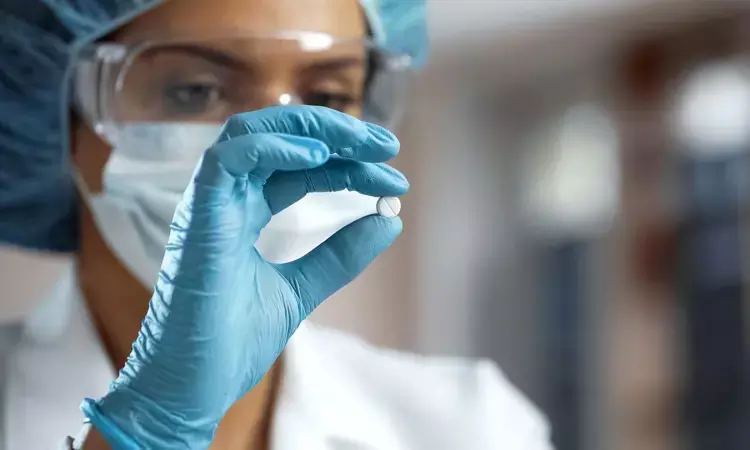- Home
- Medical news & Guidelines
- Anesthesiology
- Cardiology and CTVS
- Critical Care
- Dentistry
- Dermatology
- Diabetes and Endocrinology
- ENT
- Gastroenterology
- Medicine
- Nephrology
- Neurology
- Obstretics-Gynaecology
- Oncology
- Ophthalmology
- Orthopaedics
- Pediatrics-Neonatology
- Psychiatry
- Pulmonology
- Radiology
- Surgery
- Urology
- Laboratory Medicine
- Diet
- Nursing
- Paramedical
- Physiotherapy
- Health news
- Fact Check
- Bone Health Fact Check
- Brain Health Fact Check
- Cancer Related Fact Check
- Child Care Fact Check
- Dental and oral health fact check
- Diabetes and metabolic health fact check
- Diet and Nutrition Fact Check
- Eye and ENT Care Fact Check
- Fitness fact check
- Gut health fact check
- Heart health fact check
- Kidney health fact check
- Medical education fact check
- Men's health fact check
- Respiratory fact check
- Skin and hair care fact check
- Vaccine and Immunization fact check
- Women's health fact check
- AYUSH
- State News
- Andaman and Nicobar Islands
- Andhra Pradesh
- Arunachal Pradesh
- Assam
- Bihar
- Chandigarh
- Chattisgarh
- Dadra and Nagar Haveli
- Daman and Diu
- Delhi
- Goa
- Gujarat
- Haryana
- Himachal Pradesh
- Jammu & Kashmir
- Jharkhand
- Karnataka
- Kerala
- Ladakh
- Lakshadweep
- Madhya Pradesh
- Maharashtra
- Manipur
- Meghalaya
- Mizoram
- Nagaland
- Odisha
- Puducherry
- Punjab
- Rajasthan
- Sikkim
- Tamil Nadu
- Telangana
- Tripura
- Uttar Pradesh
- Uttrakhand
- West Bengal
- Medical Education
- Industry
Oral diabetes drug Danuglipron achieves similar weight loss as Ozempic injection: JAMA

USA: Danuglipron demonstrated a safety and efficacy profile in tune with peptidic glucagon-like peptide 1 receptor agonists in type 2 diabetes (T2D) patients without injection or fasting restrictions; a phase two clinical trial has shown. The findings were featured in JAMA Network Open on May 22, 2023.
The oral drug from Pfizer led to a comparable amount of weight loss as the blockbuster Novo Nordisk's Ozempic injection. The drug could offer an advantage as an oral treatment rather than a frequent injection.
The phase 2 randomized clinical trial of 411 adults with T2D showed that danuglipron reduced glycated haemoglobin, fasting plasma glucose, and body weight at week 16 compared with placebo. The most frequently reported adverse events are gastrointestinal.
Currently available GLP-1R (glucagon-like peptide 1 receptor) agonists for T2D treatment are peptide agonists requiring subcutaneous administration or strict fasting requirements before and after oral administration.
Danuglipron, a small molecule GLP-1R agonist, is being investigated as an adjunct to exercise and diet to improve blood sugar control in type 2 diabetes. In a phase 1 study, danuglipron reduced body weight and glycemic indexes with favourable safety and pharmacokinetic profiles in T2D patients. In a humanized mouse model, danuglipron stimulated glucose-dependent insulin release and suppressed food intake with the same effectiveness as injectable peptidic GLP-1R agonists.
Against the above background, Aditi R. Saxena from Pfizer Worldwide Research and Development and Medical in Cambridge, Massachusetts, and colleagues aimed to determine the safety, efficacy, and tolerability of multiple dose levels of the novel, oral, small molecule GLP-1R agonist danuglipron during 16 weeks.
Four hundred eleven patients with type 2 diabetes inadequately controlled by exercise and diet, with or without metformin treatment, were enrolled from 97 clinical research sites in 8 countries or regions. They received a placebo or danuglipron, 2.5, 10, 40, 80, or 120 mg, all administered twice daily with food for 16 weeks. Weekly dose escalation steps were integrated to achieve twice daily danuglipron doses of 40 mg or more.
The researchers determined a change from baseline in glycated haemoglobin (HbA1c, primary endpoint), body weight, and fasting plasma glucose (FPG) were assessed at week 16. Throughout the study period, safety was monitored, including a 4-week follow-up period. Of 411 participants randomized and treated (mean age, 58.6 years; 51% were male), 77% completed treatment.
The authors reported the following findings:
- For all danuglipron doses, fasting plasma glucose and HbA1c were statistically significantly reduced at week 16 vs placebo, with HbA1c reductions up to the least squares mean difference vs placebo of −1.16% for the 120-mg twice daily group and FPG reductions up to a least squares mean difference vs placebo of −33.24 mg/dL.
- At week 16, body weight was statistically significantly decreased compared with placebo in the 80-mg twice daily and 120-mg twice daily groups only, with the least squares mean difference vs placebo of −2.04 kg for the 80-mg twice daily group and −4.17 kg for the 120-mg twice daily group.
- The most commonly reported adverse events were vomiting, nausea, and diarrhoea.
"At week 16, danuglipron reduced fasting plasma glucose, body weight, and HbA1c compared with placebo in adults with type 2 diabetes, with a tolerability profile consistent with the mechanism of action," the researchers concluded.
Reference:
Saxena AR, Frias JP, Brown LS, et al. Efficacy and Safety of Oral Small Molecule Glucagon-Like Peptide 1 Receptor Agonist Danuglipron for Glycemic Control Among Patients With Type 2 Diabetes: A Randomized Clinical Trial. JAMA Netw Open. 2023;6(5):e2314493. doi:10.1001/jamanetworkopen.2023.14493
Dr Kamal Kant Kohli-MBBS, DTCD- a chest specialist with more than 30 years of practice and a flair for writing clinical articles, Dr Kamal Kant Kohli joined Medical Dialogues as a Chief Editor of Medical News. Besides writing articles, as an editor, he proofreads and verifies all the medical content published on Medical Dialogues including those coming from journals, studies,medical conferences,guidelines etc. Email: drkohli@medicaldialogues.in. Contact no. 011-43720751


